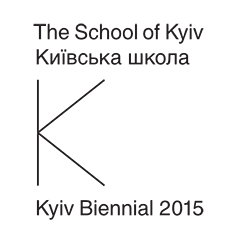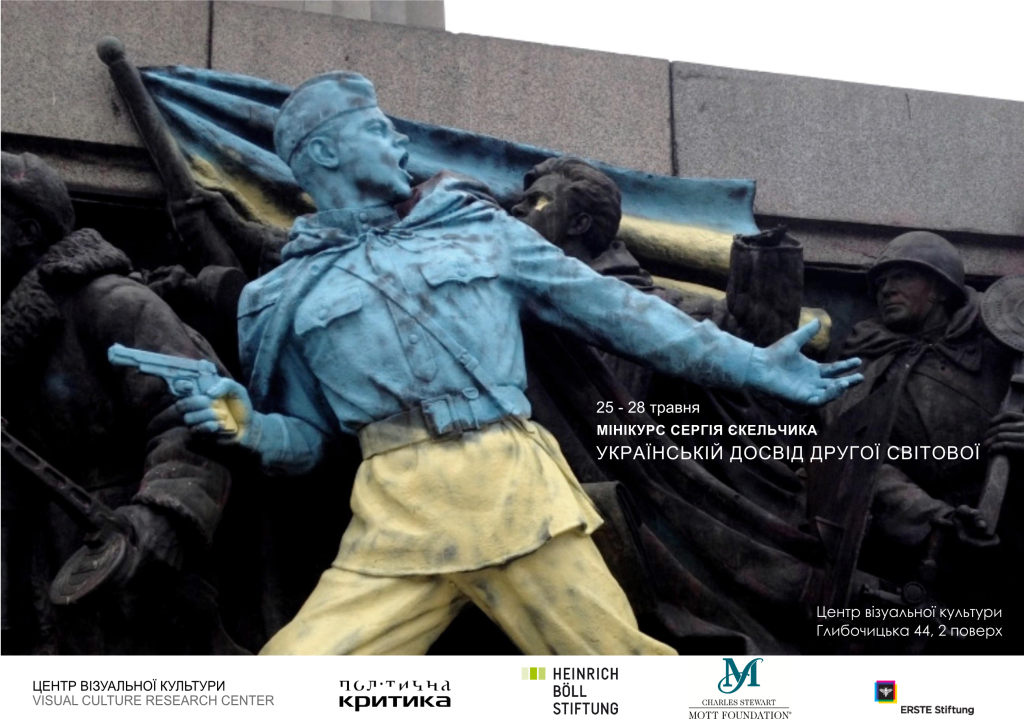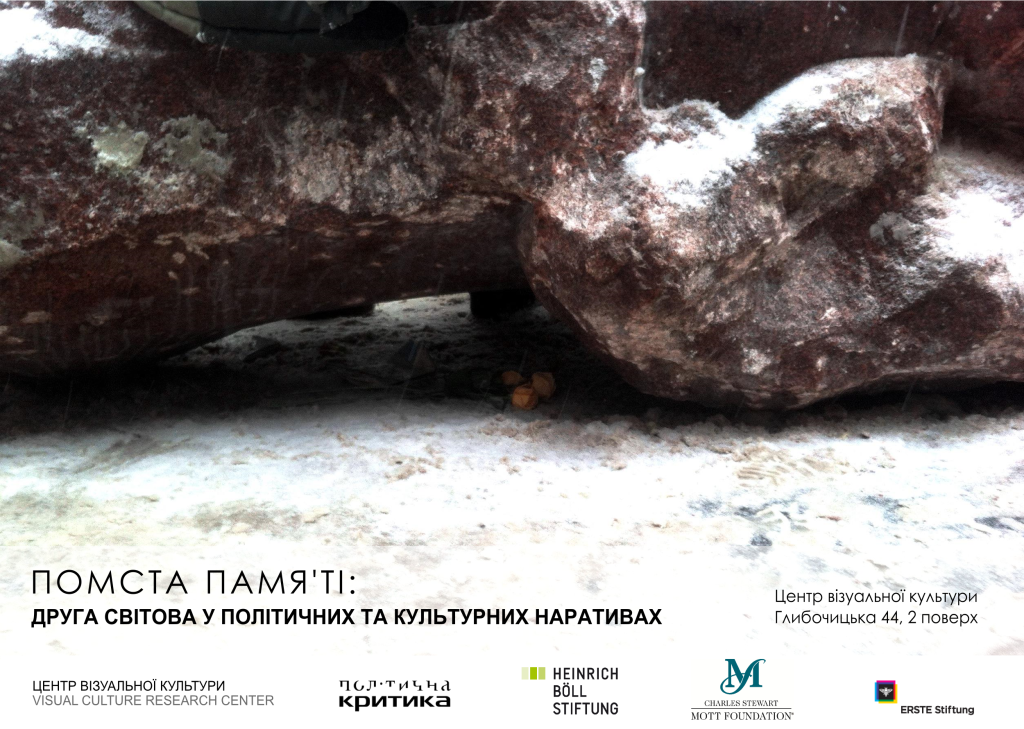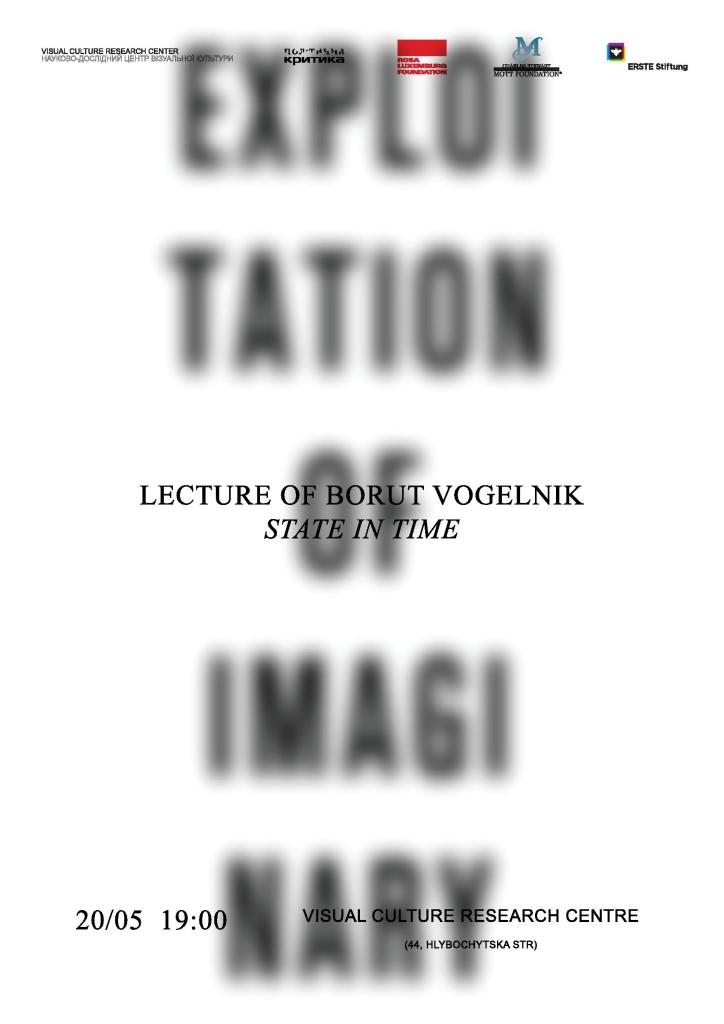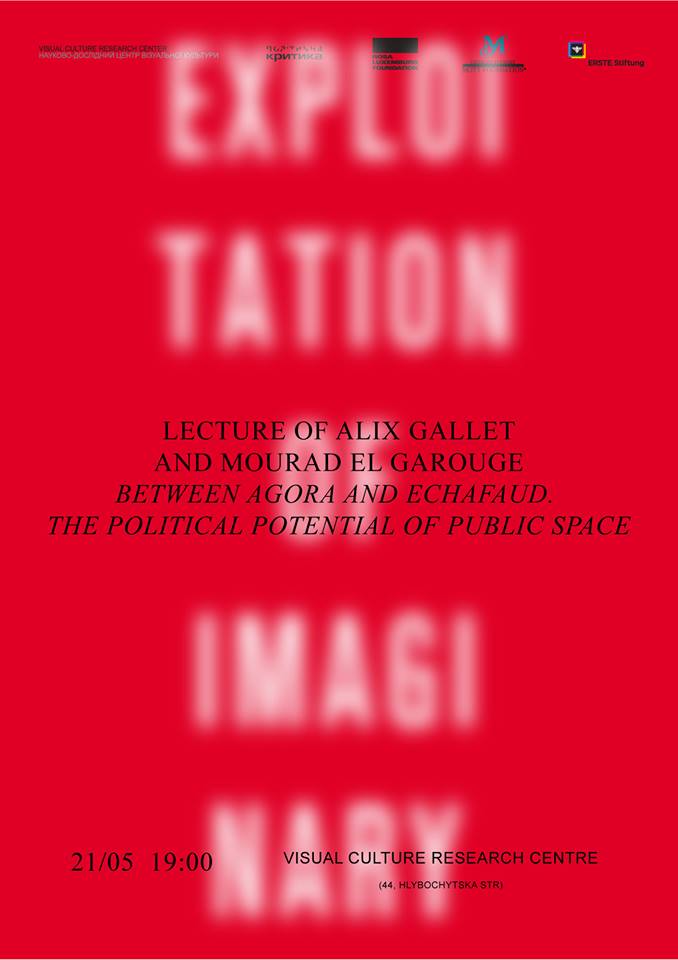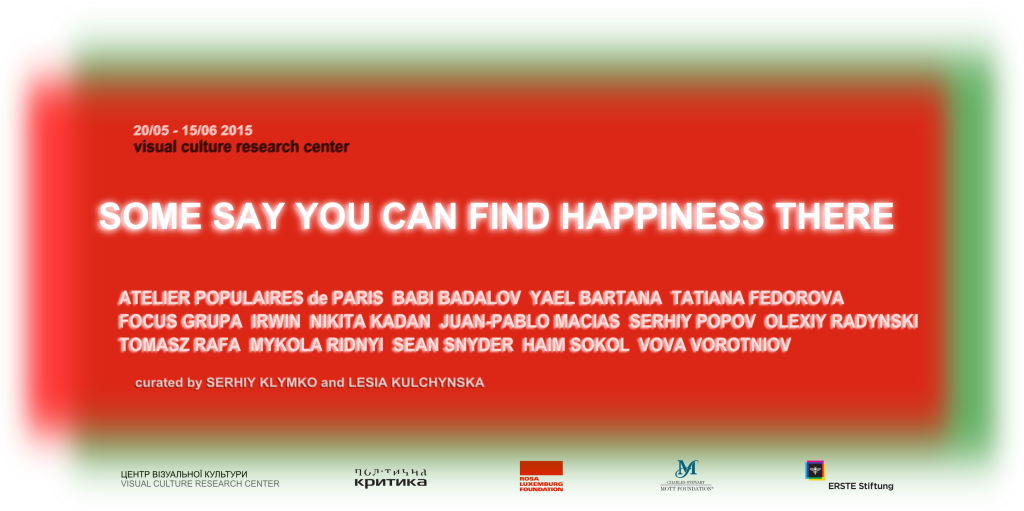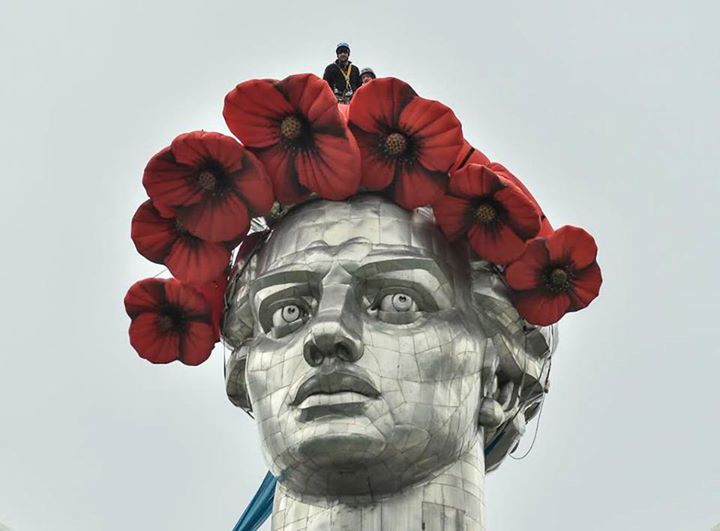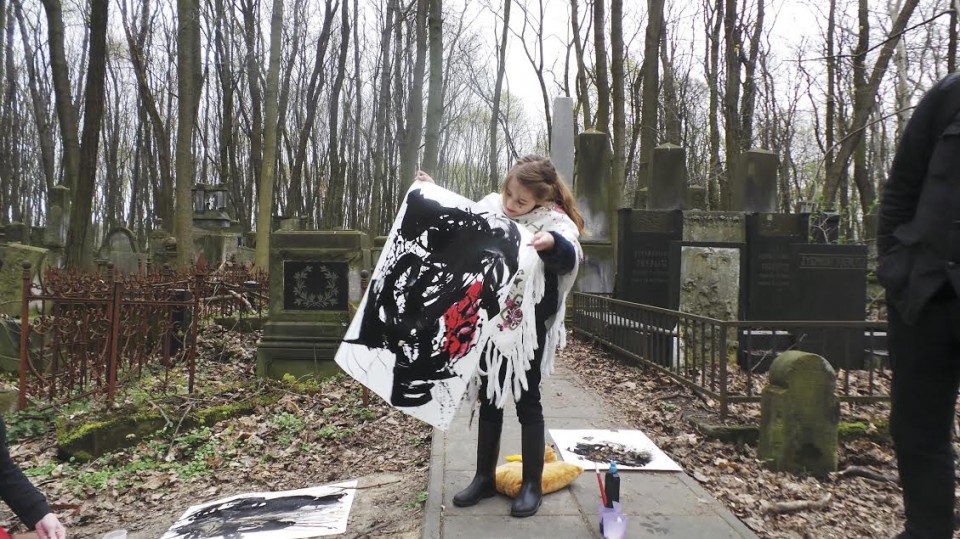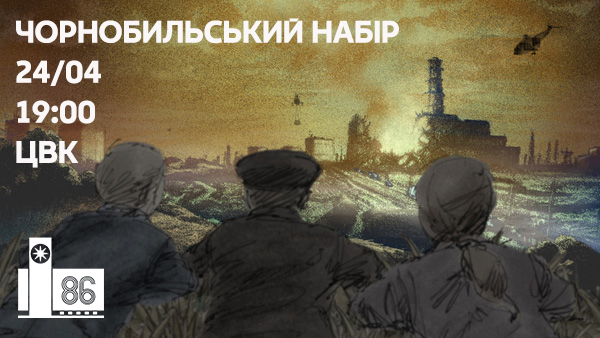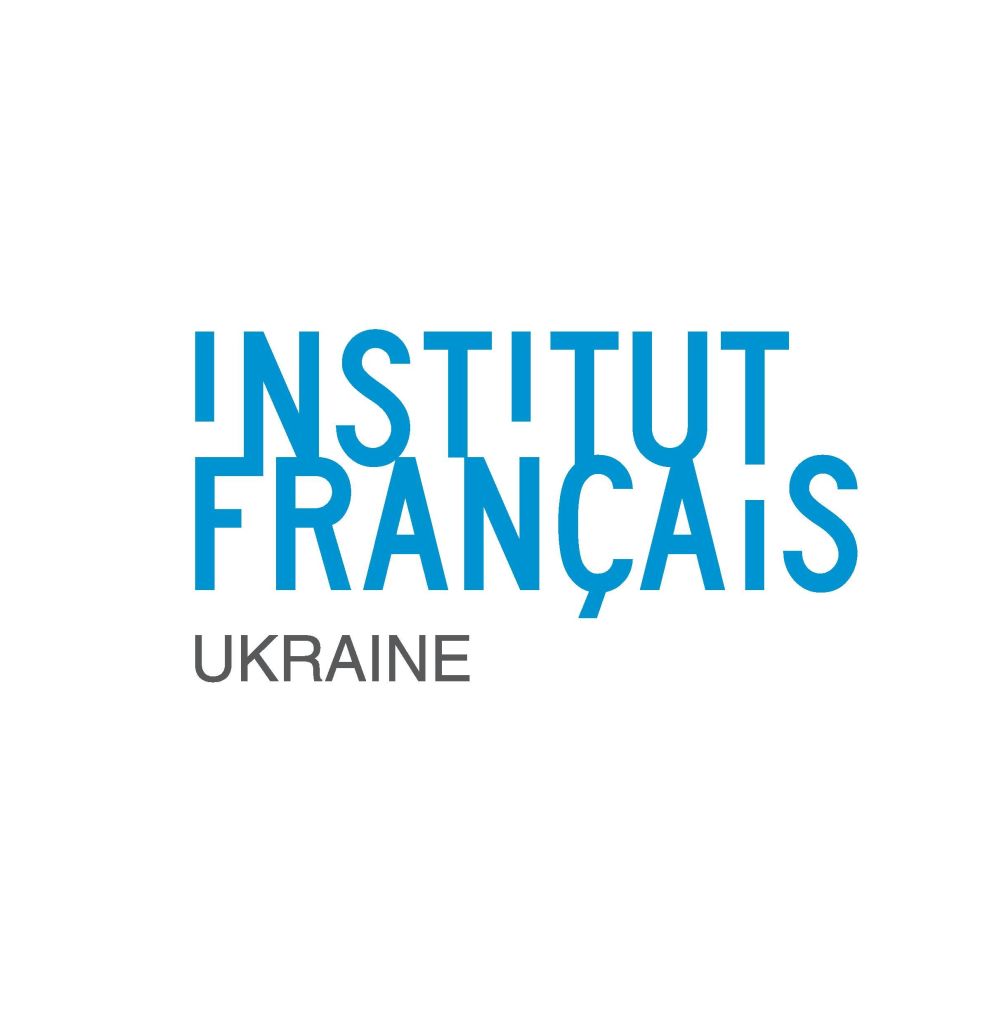Short course by Serhiy Yekelchyk
Monday – Thursday, 25 – 28 May 2015, 18:30
The Ukrainian Experience of World War II
Visual Culture Research Center (44 Hlybochytska Street (1st floor), Kyiv)
Visual Culture Research Center and Political Critique invite you to a short course by Serhiy Yekelchyk “The Ukrainian Experience of World War II”, which will take place from May 25 to 28 (Monday till Thursday) at 18.30 every day.
The short course aims to outline new approaches to the Ukrainian experience in World War II, using contemporary Western historical scholarship. We will begin with deconstructing of predominate ideas about the war and tracking changes how some narratives replace others, and then we will move on to experiences of ordinary people in wartime, usually hidden by the loud words about courage and sacrifices of the nation. Further, the short course will be focused on relationship between the war and vision of the world in ethnic categories that will allow to see the evolution of the official memory of the war from 1945 until today.
Lecture 1: Narratives of the war.
Lecture 2: Everyday life of the war.
Lecture 3: Nationalization of the war.
Lecture 4: Memory of the war.
Serhiy Yekelchyk is a historian and professor at University of Victoria (Canada). His books include “Stalin’s Empire of Memory: Russian-Ukrainian Relations in the Soviet Historical Imagination” (2004); “Ukraine: Birth of a Modern Nation” (2007), “Ukrainophiles: the World of Ukrainian Patriots of the Late Nineteenth Century” (2010), “Stalin’s Citizens: Everyday Politics in the Wake of Total War” (2014). His latest book about the Maidan and 2013-2014 events in Ukraine is in print.
To enroll, please send an email to vcrc@vcrc.org.ua. You will get readings for the course (scanned pdf files).
The short course will take place as a part of the educational project “Revenge of Memory: World War II in Political and Cultural Narratives”. The project aims to conceptualize World War II discourses, which are perceived through the recent events in Ukraine, to analyze political, rhetorical, and media strategies that use historical experience of the war, as well as to produce new ways of shaping post-war experience.
The project is supported by Heinrich Böll Stiftung (Kyiv)
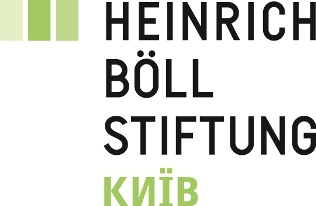
Supported by ERSTE Stiftung and Charles Stewart Mott Foundation
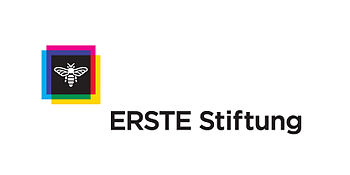
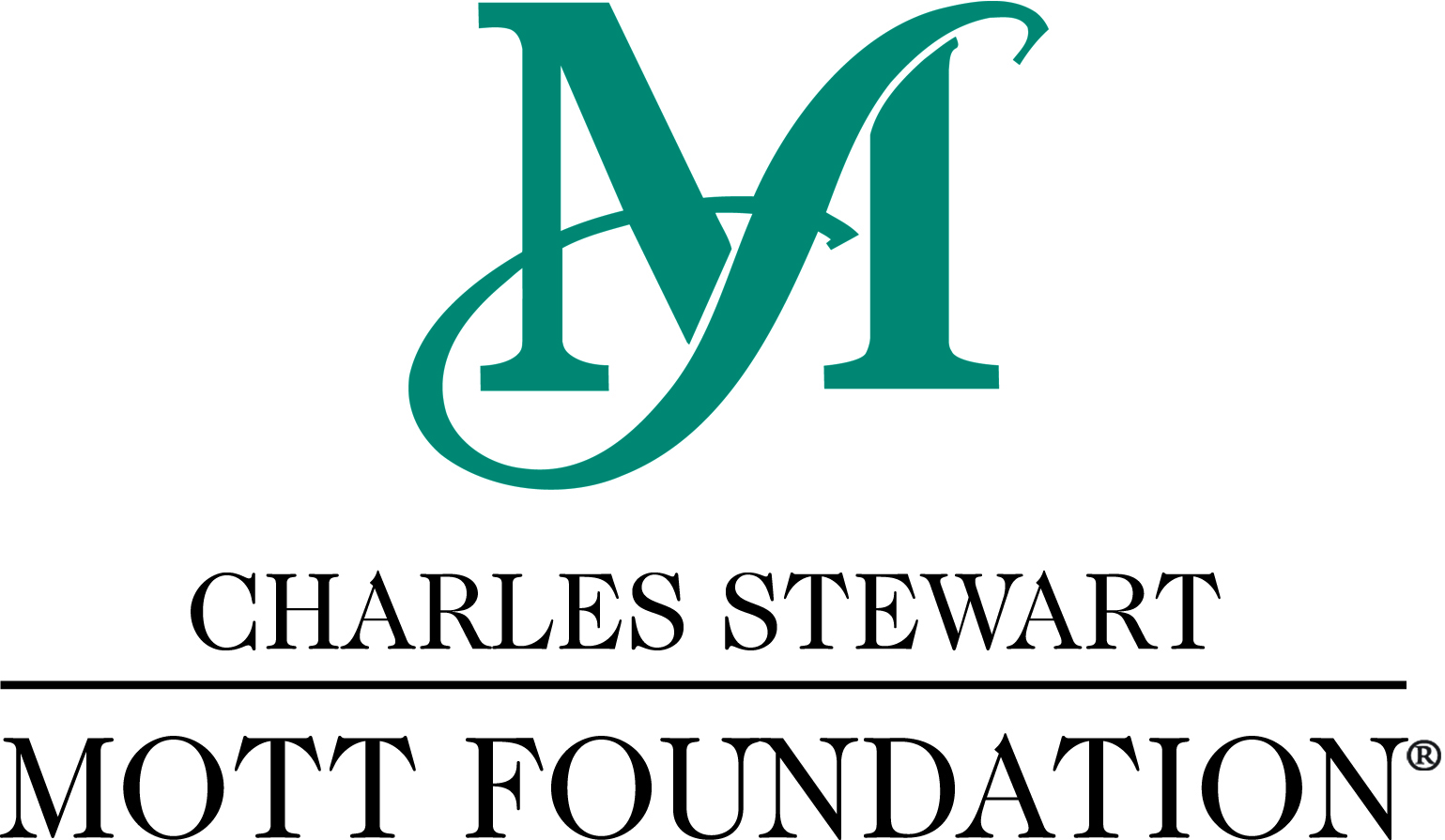
Visual Culture Research Center (VCRC) was founded in 2008 as a platform for collaboration between academic, artistic, and activist communities. VCRC is an independent initiative, which is engaged in publishing and artistic activities, scientific research, organization of public lectures, discussions, and conferences. In 2015 Visual Culture Research Center received the European Cultural Foundation’s Princess Margriet Award.
Visual Culture Research Center (44 Hlybochytska Street (1st floor), Kyiv)
Contacts:
+38096 4929600 (Nataliya Neshevets)
www.facebook.com/vcrc.org.ua
vcrc@vcrc.org.ua
Lecture by Irina Sandomirskaya
Sunday, 24 May 2015, 19:00
Black Fire on Black Flames:
Corporeal Experience and Political Theory
in Lydia Ginzburg’s “Blockade Diary”
Visual Culture Research Center (44 Hlybochytska Street (1st floor), Kyiv)
Visual Culture Research Center and Political Critique invite you to the lecture by Irina Sandomirskaya, which will take place on Sunday, 24 May, at 19:00.
Critical analysis of the concept of collective memory allows us to see how contemporary academic and political discourse uses collective memory to fetishize and commodify the past and turns it into a symbolic object of commerce and biopolitical management. The blockade successfully resists it, so the entire history of its official memorialization is a history of oblivion and silence of the real experience. The blockade is often presented as something extraordinary, as a state of exception (Giorgio Agamben), a rejection of the law in the broadest sense; thus the blockade becomes incomprehensible and its structures are not being reproduced in other social contexts. “The Blockade Diary” by Lydia Ginzburg, a brilliant theorist of the Leningrad disaster who survived and conceptualized the blockade, has tremendous value for understanding the state of exception as the economy of sense and life, as well as continuity and a deep affinity between “pathology” of the state of emergency and “normal” peacetime.
Irina Sandomirskaya is a scholar of Russian and Soviet literature and language and professor at Södetörn University (Sweden). She is an author of Kniga o rodine. Opyt analiza diskursivnykh praktik (2001) and Blokada v slove: ocherki kriticheskoi teorii i biopolitiki iazyka (2013).
Admission is free
Discussion will take place within the frameworks of educational project “Revenge of Memory: World War II in Political and Cultural Narratives”, devoted to conceptualization of World War II discourse, actualized by recent events in Ukraine, analysis of political, rhetorical, media strategies of instrumentaliation of the historical war experience, production of ways of working with post-war experience.
The project is supported by Heinrich Böll Stiftung (Kyiv)

Supported by ERSTE Stiftung and Charles Stewart Mott Foundation


Visual Culture Research Center (VCRC) was founded in 2008 as a platform for collaboration between academic, artistic, and activist communities. VCRC is an independent initiative, which is engaged in publishing and artistic activities, scientific research, organization of public lectures, discussions, and conferences. In 2015 Visual Culture Research Center received the European Cultural Foundation’s Princess Margriet Award.
Visual Culture Research Center (44 Hlybochytska Street (1st floor), Kyiv)
Contacts:
+38096 4929600 (Nataliya Neshevets)
www.facebook.com/vcrc.org.ua
vcrc@vcrc.org.ua
Lecture by the member of IRWIN group Borut Vogelnik
Friday, 22 May 2015, 19:00
Visual Culture Research Center (44 Hlybochytska Street (1st floor), Kyiv)
Visual Culture Research Center and Political Critique invite you to the lecture by the member of IRWIN group Borut Vogelnik, which will take place on Friday, 22 may, at 19:00.
The NSK state came into being in 1992 as a result of the transformation of the Neue Slowenische Kunst (New Slovenian Art) collective into the NSK State in Time. With the collapse of socialism in the beginning of the 1990s and the subsequent emergence of a multitude of new states, some of which, among them Slovenia, achieved the status of an independent state for the fist time ever in history, NSK too objectified itself in the form of a state. Instead of to a territory, however, NSK assigned the status of its state to thinking, which alters its boundaries in accordance with the movements and changes of its symbolic and physical collective body.
So far, several thousand people have applied for and obtained NSK passports and thereby become citizens of the NSK State in Time, while also retaining their previous citizenship. Most of them come from the developed countries of Western Europe or the USA, and thus the majority of NSK’s population is from the so-called First World. Their reasons for attaining NSK citizenship are linked primarily to their understanding of and participation in the field of contemporary art. However, the largest number of passports was issued in Sarajevo at the end of the war in 1995. At that time, the citizens of Bosnia and Herzegovina had serious difficulty travelling outside their country. Several years ago, applications for the NSK passport began coming from Africa, from Nigeria in particular. It seems likely that, in the Third World, NSK passports have ceased to be artifacts and have become useful documents. What is interesting is why, where, for whom and how they are useful.
Borut Vogelnik is Slovenian artist, member of IRWIN group and Neue Slowenische Kunst art collective. He is Assistant Professor at the Academy of Visual Arts in Ljubljana.
Lecture will take place at Visual Culture Research Center within the frameworks of the exhibition “Some Say You Can Find Happiness There” and “Exploitation of the Imaginary” project (May 20 – June 15, 2015).
Working language – English
Admission is free
The project is supported by Rosa Luxemburg Stiftung
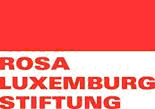
Supported by ERSTE Stiftung and Charles Stewart Mott Foundation


Visual Culture Research Center (VCRC) was founded in 2008 as a platform for collaboration between academic, artistic, and activist communities. VCRC is an independent initiative, which is engaged in publishing and artistic activities, scientific research, organization of public lectures, discussions, and conferences. In 2015 Visual Culture Research Center received the European Cultural Foundation’s Princess Margriet Award.
Visual Culture Research Center (44 Hlybochytska Street (1st floor), Kyiv)
Contacts:
+38096 4929600 (Nataliya Neshevets)
www.facebook.com/vcrc.org.ua
vcrc@vcrc.org.ua
Between Agora and Scaffold: Political Potential of Public Space
Thursday, 21 May 2015, 19:00
Visual Culture Research Center (44 Hlybochytska Street (1st floor), Kyiv)
Visual Culture Research Center and Political Critique invite you to the lecture and presentation of work Gemonian Scaffold by Alix Gallet and Mourad El-Garouge (Ateliers Populaires de Paris), which will take place on Thursday, 21 May, at 19:00.
During their lecture Alix Gallet and Mourad El-Garouge will tell about their work Geminian Scaffold, presented at the international exhibition “Some Say You Can Find Happiness There” at Visual Culture Research Center, and its historical contextualization.
The Gemonian Scaffold is a structure designed for the public space and inspired by French revolutionary carpenter Sieur Gérard. The title of this work refers to notorious Scalae Gemoniae – Gemonian stairs from the times of Roman Empire, which was used for public executions and demonstration of bodies. Another important analogy between the title of this object and its function is the similarity between words “scaffold” and “scaffoldings”. Gemonian Scaffold is conceived as a temporary agora made of standard elements of scaffoldings, which serve as a supporting structure at construction sites.
The Gemonian Scaffold is meant to facilitate public debates and gatherings of all kinds and in any context, depending on community needs. While addressing questions of political nature of public space, the Gemonian Scaffold remains a functional structure to be used by society.
Alix Gallet is member of Ateliers Populaires de Paris. She studied media design at the Design Academy of Eindhoven and fashion at the ESAA Duperré in Paris. Her synergistic approach is close to fiction design and research trends. Gallet’s most recent projects include issues as varied as biometric identification, behavioral packing unit online and gamification interactions.
Mourad El-Garouge is member of Ateliers Populaires de Paris. Since 2012, he has been project manager at the Palais des Congrès de Montreuil, where he coordinates the contemporary art fair “Les Hivernales”. In 2014, he created Artefiz, an independent publishing house, as well as cultural promotion association, “L ‘Art est vivant”.
Ateliers Populaires de Paris (APP) is a cooperative office operating in construction and design. It was created in Paris in October 2014 by five professionals active in the fields of architecture, cultural research, urban planning, education, and communication. APP offers services for territorial studies, art research, development of architectural projects and media design.
Presentation will take place at Visual Culture Research Center within the frameworks of the exhibition “Some Say You Can Find Happiness There” and “Exploitation of the Imaginary” project, which lasts from May 20 until June 15, 2015.
Admission is free
The project is supported by Rosa Luxemburg Stiftung

Supported by ERSTE Stiftung and Charles Stewart Mott Foundation


Visual Culture Research Center (VCRC) was founded in 2008 as a platform for collaboration between academic, artistic, and activist communities. VCRC is an independent initiative, which is engaged in publishing and artistic activities, scientific research, organization of public lectures, discussions, and conferences. In 2015 Visual Culture Research Center received the European Cultural Foundation’s Princess Margriet Award.
Visual Culture Research Center (44 Hlybochytska Street (1st floor), Kyiv)
Contacts:
+38096 4929600 (Nataliya Neshevets)
www.facebook.com/vcrc.org.ua
vcrc@vcrc.org.ua
Exhibition “SOME SAY YOU CAN FIND HAPPINESS THERE”
Wednesday, 20 May 2015, 19:00
Visual Culture Research Center (44 Hlybochytska Street (1st floor), Kyiv)
Visual Culture Research Center and Political Critique invite you to the exhibition “Some Say You Can Find Happiness There” at Visual Culture Research Center (Kyiv, Ukraine), which will take place from 20 May till 15 June 2015. Opening: Wednesday, 20 May, at 19:00.
Political map of the world may be understood as a museum of collective fantasies, which once gained a piece of territory for their realization. Some of them died, failing the reality-test, but continue haunting their demesnes like specters, some gave up their spaces to other dreams, some carry out expansion claiming new territories. However, there is also a map of imaginary world for the dreams of communities that have vanished or, on the contrary, are still emerging and keep struggling for their place in reality.
During the recent year our ideas about the state that used to seem obvious, have transformed into open questions. Maidan, which was compared to a utopian republic, questioned relations between the society and the state, and generated the surge of projects for its transformation. The change in the familiar contours happened before our very eyes, the common visual image of the Ukrainian state is now in conflict with its actual borders, and hundreds of thousands of people woke up in a different country. We witnessed how political utopias, multiplied by a potential of contemporary media, are being implemented, increasing the number of views in social networks, as well as the number of destroyed human lives.
Open questions demand answers. We have to look at the map of contemporary political imagination in order to see the ways we follow in search of the common happiness, in order to reconsider concepts and images, which today’s political relations, as well as our dreams and fantasies, are based on.
Participants: Atelier Populaires de Paris (France), Babi Badalov (Azerbaijan-France), Yael Bartana (Israel), Tatiana Fedorova (Moldova), Focus Grupa (Croatia), IRWIN Group (Slovenia), Nikita Kadan (Ukraine), Juan-Pablo Macías (Mexico), Serhiy Popov (Ukraine), Oleksiy Radynski (Ukraine), Tomáš Rafa (Slovakia), Mykola Ridnyi (Ukraine), Sean Snyder (USA), Haim Sokol (Russia), Vova Vorotniov (Ukraine).
Curated by Serhiy Klymko and Lesia Kulchynska
The exhibition will take place within the frameworks of the project “Exploitation of the Imaginary”, dedicated to the research of political imagination in the age of its mechanical reproduction and the capability of art to fight for its right to structure society.
Admission is free
The project is supported by Rosa Luxemburg Stiftung

Supported by ERSTE Stiftung and Charles Stewart Mott Foundation


Visual Culture Research Center (VCRC) was founded in 2008 as a platform for collaboration between academic, artistic, and activist communities. VCRC is an independent initiative, which is engaged in publishing and artistic activities, scientific research, organization of public lectures, discussions, and conferences. In 2015 Visual Culture Research Center received the European Cultural Foundation’s Princess Margriet Award.
Visual Culture Research Center (44 Hlybochytska Street (1st floor), Kyiv)
Contacts:
+38096 4929600 (Nataliya Neshevets)
www.facebook.com/vcrc.org.ua
vcrc@vcrc.org.ua
Discussion “World War II: Ukrainian Version”
Tuesday, 12 May 2015, 19:00
Visual Culture Research Center (44 Hlybochytska Street (1st floor), Kyiv)
Visual Culture Research Center and Political Critique invite you to the discussion “World War II: Ukrainian Version”, which will take place on Tuesday, 12 May, at 19:00.
Discussion “World War II: Ukrainian Version” is dedicated to Ukrainian historiography of the 2nd World War, its key events and issues. Where does “the Great Patriotic War” ends and “2nd World War” starts in the situation of post-Soviet self-determination? What is the role of Ukraine in contemporary World War II narratives? The war of nations, ethnicities, and states: whom did Ukrainians fight in World War II? Holocaust in Ukraine: Debates on the role of Ukrainians in the extermination of Jews. How has Ukrainian state changed since the 2nd World War?
Participants:
Serhiy Yekelchyk is historian, who teaches at the University of Victoria (Canada). He is author of the books Empire of Memory: Russian-Ukrainian Relations in Soviet Historical Imagination (2008), History of Ukraine: The Birth of Modern Nation (2007). At the moment he is working on the book about Stalinist political rituals.
Ivan Homza is political theorist and historian, who researches European fascism and integral nationalism. He teaches at the Department of Political Science (National University of “Kyiv-Mohyla Academy”).
Iryna Sklokina holds a PhD in History and explores official Soviet politics of memory about the War. She is a Fellow Researcher at Center for Urban History of East Central Europe (Lviv).
Moderator:
Kateryna Ruban is a PhD candidate at New York University, member of Visual Culture Research Center, researcher of Soviet history.
Admission is free
Discussion will take place within the frameworks of educational project “Revenge of Memory: World War II in Political and Cultural Narratives”, devoted to conceptualization of World War II discourse, actualized by recent events in Ukraine, analysis of political, rhetorical, media strategies of instrumentaliation of the historical war experience, production of ways of working with post-war experience.
Admission is free
The project is supported by Heinrich Böll Stiftung (Kyiv)

Supported by ERSTE Stiftung and Charles Stewart Mott Foundation


Visual Culture Research Center (VCRC) was founded in 2008 as a platform for collaboration between academic, artistic, and activist communities. VCRC is an independent initiative, which is engaged in publishing and artistic activities, scientific research, organization of public lectures, discussions, and conferences. In 2015 Visual Culture Research Center received the European Cultural Foundation’s Princess Margriet Award.
Visual Culture Research Center (44 Hlybochytska Street (1st floor), Kyiv)
Contacts:
+38096 4929600 (Nataliya Neshevets)
www.facebook.com/vcrc.org.ua
vcrc@vcrc.org.ua
Artur Żmijewski will present his new films
Tuesday, 28 April 2015, 19:00
Visual Culture Research Center (44 Hlybochytska Street (1st floor), Kyiv)
On Tuesday, 28 April 2015, at 19:00 the screening of new films by Artur Żmijewski will take place at Visual Culture Research Center.
The new series of films by Artur Żmijewski was created during the years 2013 – 14 after a break caused by his work on the 7th Berlin Biennial (2012). In his films Żmijewski continues to explore the connections between power, art, and society.
Critique of religion as the instrument of power is one of the central topics for Żmijewski. His Film Mass 2 (2014) is the continuation of his experiments with placing religious rituals in the secular space of art. In Autumn 2014 Artur Żmijewski staged catholic mass at Krakow National Theatre. Mass 2 depicts this process as an answer to intrusion of religion into secular society.
During the year 2014 Artur Żmijewski created the series of short films in collaboration with female prisoners at Warsaw penal colony (Brushworks, Cookbook, Making of). These films document the series of workshops which transformed the disciplinary institution into the place for creative work. Films Total Landscape and Stranger show artistic experiments with the issue of everyday violence.
The films will be presented by the author. Discussion will follow.
Screening program:
Mass 2, 18’
Brushworks, 6’
Cookbook, 12’
Making of, 9’
Total Landscape, 5’
Stranger, 12’
Artur Żmijewski is an artist, film director, and curator. He is the artistic editor of Political Critique magazine (Krytyka Polityczna). He represented Poland at 51st Venice Biennial (2004). His works were shown at the Museum of Modern Art (New York), KunstWerke (Berlin), National Gallery of Art Zachęta, Documenta 12 (2007), Manifesta 4 (2002) etc. In 2012 he curated the 7th Berlin Biennial. In 2012 his personal exhibition Democracies took place at Visual Culture Research Center.
Working language – English
Admission is free
Supported by ERSTE Stiftung and Charles Stewart Mott Foundation


Visual Culture Research Center (VCRC) was founded in 2008 as a platform for collaboration between academic, artistic, and activist communities. VCRC is an independent initiative, which is engaged in publishing and artistic activities, scientific research, organization of public lectures, discussions, and conferences. In 2015 Visual Culture Research Center received the European Cultural Foundation’s Princess Margriet Award.
Contacts:
+380631481204 (Nazariy Sovsun)
www.facebook.com/vcrc.org.ua
vcrc@vcrc.org.ua
Screening of short film program CHERNOBYL SET
Friday, 24 April 2015, 19:00
Visual Culture Research Center (44 Hlybochytska Street (1st floor), Kyiv)
Visual Culture Research Center and Political Critique invite you to a special screening of short film program CHERNOBYL SET presented by “86” festival, which will take place on Friday, 24 April, at 19:00.
The personal stories, social dimension, and fantastic plots. Look at the trace of The Explosion in short films from all over the world in the special program Chernobyl Set. The program will be presented by culture and film theorist, co-founder of Visual Culture Research Center, Olga Bryukhovetska. After the screening presentation of Second Festival of Film and Urbanism “86” program and discussion with festival curator Illya Gladstein will take place.
Chernokids
France, 2010, 7’
Directed by Marion Petegnief, Matthieu Bernadat, Nils Boussuge, Florence Ciuccoli, and Clément Deltour
Somewhere in Ukraine, three deformed orphans decide to visit their mother, which they believe to be a Nuclear Power Plant.
GAMMA
UK, Ukraine, Kazakhstan, 2012, 7’
Factory Fifteen in association with Unknown Fields
In a post-nuclear future, when the earth is riddled with radiation, a new urban developer proposes to regenerate the cities back into civilization. GAMMA sets out to stabilize the atomic mistakes of yesteryear for the re-inhabitation of future generations.
Leonid’s Story
Germany, Ukraine, 2011, 19’
Directed by Reiner Ludwigs
Leonid is a policeman from Kopachi village, he grew up next to the Chernobyl nuclear reactor. He suddenly found himself in the middle of the catastrophe which broke his life, ruined his health, and threatens his unborn child. Yet his work takes him right into the contaminated zone.
Mi-cro-phone!
USSR, 1988, 20’
Directed by Georgiy Shklarevski
Ukrainian News and Documentary Film Studio
The film displays the consequences of Chernobyl nuclear disaster beyond the 30-km Exclusion Zone, as well as the silencing of the aftermath by Soviet authorities. It was filmed in 1988 in Narodnytskyi district of Zhytomyr region.
The Territory of Childhood
Russia, 2012, 23’
Directed by Anna Rada
Postgraduate School for Screenwriters and Film Directors
Prypyat secondary school’s Class of 1986 gets together for their first reunion in 25 years and a visit to the territory of their childhood.
Admission is free
Supported by ERSTE Stiftung and Charles Stewart Mott Foundation


Visual Culture Research Center (VCRC) was founded in 2008 as a platform for collaboration between academic, artistic, and activist communities. VCRC is an independent initiative, which is engaged in publishing and artistic activities, scientific research, organization of public lectures, discussions, and conferences. In 2015 Visual Culture Research Center received the European Cultural Foundation’s Princess Margriet Award.
Contacts:
+380631481204 (Nazariy Sovsun)
www.facebook.com/vcrc.org.ua
vcrc@vcrc.org.ua
Yves Cohen. New Politics of the Streets
Thursday, 23 April 2015, 19:00
Visual Culture Research Center (44 Hlybochytska Street (1st floor), Kyiv)
Visual Culture Research Center and Political Critique invite you to the lecture by Yves Cohen “New Politics of the Streets”, which will take place on Thursday, 23 April, at 19:00.
The 20th century is considered to be not only the century of scientific progress and democracy, but also totalitarianism, autocracy, and personality cult. Protest movements of the last 5 – 6 years in Brazil, Turkey, Tunisia, Ukraine performed a real critique of the vertical power structures. In his lecture, French historian Yves Cohen will present historical analysis of the events in Rio de Janeiro, in which he participated himself, as well as the events in Kyiv, Sofia, Tunisia, Istanbul, arguing whether recent protests could lead to other types of politics, and whether the 21st century could become “horizontal”.
Yves Cohen is historian, School for Advanced Studies in the Social Sciences (EHESS, Paris). He conducts research on the forms and conceptions of power, personality cult, the figure of the leader in the 20th century France, USA, USSR, and Germany. He authored numerous books and articles about the political regime in USSR.
Moderator – Nazariy Sovsun
Admission is free
Working language – English
Supported by ERSTE Stiftung and Charles Stewart Mott Foundation


Visual Culture Research Center (VCRC) was founded in 2008 as a platform for collaboration between academic, artistic, and activist communities. VCRC is an independent initiative, which is engaged in publishing and artistic activities, scientific research, organization of public lectures, discussions, and conferences. In 2015 Visual Culture Research Center received the European Cultural Foundation’s Princess Margriet Award.
Contacts:
+380631481204 (Nazariy Sovsun)
www.facebook.com/vcrc.org.ua
vcrc@vcrc.org.ua
France Guérin-Pace. Realization of Identity: Between the Origin and Life Journey
Visual Culture Research Center, Poltical Critique and Institut français d’Ukraine invite you to the lecture by France Guérin-Pace, which will take place on Tuesday, 21 April, at 19:00 within the frameworks of the program Migrations, Identities, Territories, meant to take place during the year 2015.
We are all bound by a number of different places: the place of birth, of the family origins, places, where we or our relatives reside, places of our dreams and imagination. All these places are arranged in a personal identification geographical heritage, which, depending on a concrete person and life situation, can be either partly involved, or not involved at all. In her lecture France Guérin-Pace will explain how geographical representation of the individual is formed, how we built our relationships with different places during our life journey, in what way we give sense to real and imaginary places of our former and present residence, what determines population’s feeling of belonging to a specific territory.
France Guérin-Pace is a Fellow Researcher at National Institute for Demographic Research (Paris), where she supervises the research laboratory “Identities and territories of population”. She is a geographer, who explores connections between the construction of identity and territories in individual and collective dimensions, problems of belonging to a specific territory as it is related to geographical paths, new places of residence, and migration.
Lecture program Migrations, Identities, Territories was developed by Institut français d’Ukraine in partnership with Center of French-Russian Studies (CEFR) and will take place during the year 2015.
French identity was formed as a result of displacements of the population. Outflow of rural population and its concentration in huge industrial zones, labour migrations in the 19 – 20th century, post-war migrations, reception of refugees, camps of displaced individuals, decolonization followed by the return of colonizers and emigration from former colonies – all these processes shaped the image of contemporary France. Migrations, borders and regional identities are being questioned today mostly within the European Union. Being central for French historians, sociologists, and demographers, these questions are important in contemporary Ukrainian context too. During the course Migrations, Identities, Territories Ukrainian public will have chance to aquaint itself with the research of French leading scholars and discuss in what way these challenges emerge here today.
Admission is free
Working language – French, with consecutive interpretation into Ukrainian
Supported by ERSTE Stiftung and Charles Stewart Mott Foundation


Visual Culture Research Center (VCRC) was founded in 2008 as a platform for collaboration between academic, artistic, and activist communities. VCRC is an independent initiative, which is engaged in publishing and artistic activities, scientific research, organization of public lectures, discussions, and conferences. In 2015 Visual Culture Research Center received the European Cultural Foundation’s Princess Margriet Award.
Contacts:
+380631481204 (Nazariy Sovsun)
www.facebook.com/vcrc.org.ua
vcrc@vcrc.org.ua

